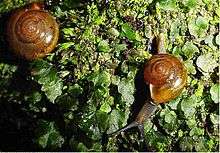Ariophantidae
| Ariophantidae | |
|---|---|
 | |
| Two live individuals of Macrochlamys indica | |
| Scientific classification | |
| Kingdom: | Animalia |
| Phylum: | Mollusca |
| Class: | Gastropoda |
| (unranked): | clade Heterobranchia
clade Euthyneura |
| Superfamily: | Helicarionoidea |
| Family: | Ariophantidae Godwin-Austen, 1888[1] |
| Genera | |
|
See text | |
Ariophantidae is a taxonomic family of air-breathing land snails and semi-slugs, terrestrial pulmonate gastropod mollusks in the superfamily Helicarionoidea (according to the taxonomy of the Gastropoda by Bouchet & Rocroi, 2005).[2]
Distribution
The distribution of the family Ariophantidae includes India and south-eastern Asia.[3]
Anatomy
Snails within this family make and use love darts made of chitin.
In this family, the number of haploid chromosomes lies between 21 and 25 and also lies between 31 and 35, but other values are also possible (according to the values in this table).[4]
Taxonomy
Subfamilies
The family Ariophantidae consists of 3 subfamilies (according to the taxonomy of the Gastropoda by Bouchet & Rocroi, 2005):[2]
- Ariophantinae Godwin-Austen, 1888 - synonyms: Naninidae Pfeffer, 1878 (inv.); Hemiplectinae Gude & B. B. Woodward, 1921[5]
- Macrochlamydinae Godwin-Austen, 1888[1] - synonyms: Tanychlamydinae H. B. Baker, 1928;[6] Vitrinulini Schileyko, 2003[7]
- Ostracolethinae Simroth, 1901[8] - synonyms: Myotestidae Collinge, 1902;[9] Parmarioninae Godwin-Austen, 1908;[10] Laocaiini Schileyko, 2002;[11] Microparmarionini Schileyko, 2003[12]
Genera
Genera in the family Ariophantidae include:
Ariophantinae
- Ariophanta Desmoulins, 1829 - type genus of the family Ariophantidae[2]
- Hemiplecta Albers, 1850[2]
Macrochlamydinae
- Macrochlamys Gray, 1847 - type genus of the subfamily Macrochlamydinae[2]
- Tanychlamys Benson, 1834[2]
- Vitrinula Gray, 1857[2][13]
Ostracolethinae
- Laocaia Kuzminykh, 1999[2]
- Microparmarion Simroth, 1893[2]
- Myotesta Collinge, 1901[2]
- Ostracolethe Simroth, 1901 - type genus of the subfamily Ostracolethinae[2]
- Parmarion P. Fischer, 1855[2]
unsorted:
- Cryptozona Moerch, 1872
- Euplecta Semper, 1870
- Mariaella Gray, 1855
- Indrella Godwin-Austen, 1901
- Ratnadvipia Godwin-Austen, 1899[14] - endemic to Sri Lanka[15]
- Kalidos Gude, 1911
- Koratia Godwin-Austen, 1919
- Microcystina Mörch, 1872
- Sitala H. Adams, 1865
Cladogram
The following cladogram shows the phylogenic relationships of this family with other families in the limacoid clade:[3]
| limacoid clade |
| ||||||||||||||||||||||||||||||||||||||||||||||||||||||||||||||||||||||||||||||||||||||||||||||||||||||
| |
References
- 1 2 Godwin-Austen H. H. (April 1888). Land and freshwater Mollusca of India. including South Arabia, Baluchistan, Afghanistan, Kashmir, Nepal, Burmah, Pegu, Tenasserim, Malay Peninsula, Ceylon, and other islands of the Indian Ocean, supplementary to Messrs. Theobald and Hanley's Conchologia Indica. Taylor & Francis, London, volume 1, part 6: 207-257, page 253.
- 1 2 3 4 5 6 7 8 9 10 11 12 Bouchet P.; Rocroi J.-P.; Frýda J.; Hausdorf B.; Ponder W.; Valdés Á. & Warén A. (2005). "Classification and nomenclator of gastropod families". Malacologia: International Journal of Malacology. Hackenheim, Germany: ConchBooks. 47 (1-2): 1–397. ISBN 3-925919-72-4. ISSN 0076-2997.
- 1 2 Hausdorf B. (2000). "Biogeography of the Limacoidea sensu lato (Gastropoda: Stylommatophora): Vicariance Events and Long-Distance Dispersal". Journal of Biogeography 27(2): 379-390. doi:10.1046/j.1365-2699.2000.00403.x, JSTOR.
- ↑ Barker G. M. (2001). Gastropods on Land: Phylogeny, Diversity and Adaptive Morphology. in Barker G. M. (ed.): The biology of terrestrial molluscs. CABI Publishing, Oxon, UK, 2001, ISBN 0-85199-318-4. 1-146, cited pages: 139 and 142.
- ↑ Gude G. P. L. K. & Woodward B. B. (1921). "On Helicella, Férussac". Proceedings of the Malacological Society of London 14(5-6): 174-190. page 186.
- ↑ Baker H. B. (1928). Proceedings of the Academy of Natural Sciences of Philadelphia 80: 6.
- ↑ Schileyko (2003). Treatise on Recent terrestrial pulmonate molluscs, part 10: page 1354
- ↑ Simroth H. (30 December 1901). Zoologischer Anzeiger 25(660): 64.
- ↑ Collinge (1902). The Journal of Malacology 9: 11.
- ↑ Godwin-Austen H. H. (1908). In: Blanford W. T. & Godwin-Austen H. H. (1908). The fauna of British India. Mollusca. Testacellidae and Zonitidae, page 180.
- ↑ Schileyko (2002). Treatise on Recent terrestrial pulmonate molluscs, part 9: page 1219.
- ↑ Schileyko (2003). Treatise on Recent terrestrial pulmonate molluscs, part 10: page 1337.
- ↑ Mollusc Specialist Group (1996). Vitrinula chaunax. In: IUCN 2011. IUCN Red List of Threatened Species. Version 2011.1. <www.iucnredlist.org>. Downloaded on 10 July 2011.
- ↑ Godwin-Austen H. H. (1899). "Address of the president". Proceedings of the Malacological Society of London 3: 241-262. page 251, 253.
- ↑ Raheem D. & Naggs F. (2006). "The Sri Lankan endemic semi-slug Ratnadvipia (Limacoidea: Ariophantidae) and a new species from southwestern Sri Lanka". Systematics and Biodiversity 4(1): 99-126. doi:10.1017/S1477200005001854.
Further reading
- Schileyko A. A. (2003). "Treatise on recent terrestrial pulmonate mollusks. 10. Ariophantidae, Ostracolethaidae, Ryssotidae, Milacidae, Dyakiidae, Staffordiidae, Gastrodontidae, Zonitidae, Daudebardiidae, Parmacellidae". Ruthenica, Supplement 2. 1309-1466.
External links
| Wikimedia Commons has media related to Ariophantidae. |